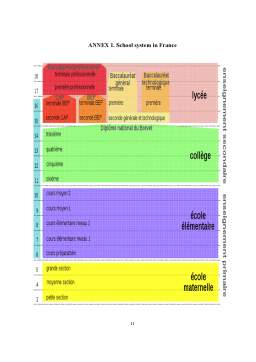Cuprins
- INTRODUCTION 4
- CHAPTER 1- EDUCATIONAL STRUCTURE 5
- CHAPTER 2 – FRANCE DUAL UNIVERSITY SYSTEM 7
- CHAPTER 3 - DILEMMAS, CHANGES AND TRENDS IN FRANCE EDUCATION 8
- CONCLUSIONS 9
- BIBLIOGRAPHY 10
- ANNEX 1 – SCHOOL SYSTEM IN FRANCE 11
Extras din proiect
INTRODUCTION
The French don't regard childhood as an age of innocence but see it as an age of ignorance. Children must be set straight and corrected."
Pascal Nadeau , journalist Francoise
The system of education developed in France has many similarities with the one implemented in Romania and because of that I decided to develop this subject more deeply.
The educational structure has many levels and it is created in such way to encourage parents to send their child from early ages to attend the school.
Moving up in the in the higher education systems of France is worth to observe that the future students have an opportunity to chose from a dual university system that is developed largely on the second chapter.
As every structure that have been implanted years ago- educational structure have almost 50 years since being implemented first time- the need for changes it is necessary because of the modern trends and also for attracting new foreign students.
CHAPTER 1- EDUCATIONAL STRUCTURE
Around 13 million pupils attend school in France. The system is a unified one, whose present general structure :primary education (enseignement primaire); secondary education (enseignement secondaire); higher education (enseignement supérieur).
Since the 1970s, France has also had an outstanding record with respect to the development of pre-school education; all 3- to 5-year-olds can go to nursery classes, named école maternelle .Kids start school very early : school starts at age 2 (for 52% of children) or 3 (for almost 100%) and children spend 2 or 3 years in maternelle (kindergarten).
Since 1967, school attendance has been compulsory for those from 6 to 16 years of age. France has 60,000 primary schools catering to pupils during their first five years of formal education: the first three years (CP - cours préparatoire - and CEl/CE2 - cours élementaire 1 and 2) provide a grounding in the basic skills. The next stage - CM1/CM2 (cours moyen 1 and 2) takes the children up to the end of primary school.
Secondary schooling is divided into two successive stages, known as cycles. From 11 to 15 years, almost all children now attend a collège, taking them from form 6 (sixième) to form 3 (troisième). Since 1975 there has been a single mixed-ability collège for all pupils regardless of their level of achievement. After form 3, they move onto a general, technical or vocational lycée. These prepare pupils for the corresponding baccalauréat examinations (referred to as le bac), which they normally take at the age of 18. The final exam, the "Baccalauréat" or "Bac" is very important for French students because it gives them access to university studies, with no further selection. It is a rigorous exam with no multiple choice questions: it includes a written part and an oral part, with several subjects each. It lasts up to six days. Less than 20 per cent of those who take it fail. Every year, the "bac" is one of the major events of the month of June and newspapers publish and discuss the subjects in Philosophy and Literature. The French love it and refuse to change it.
Decisions about pupils (repeating years, moving up to a higher class, changing course) are taken through a procedure involving a dialogue between the school (teachers, administrative and ancillary staff) and the families and pupils. Although the teachers give their opinions in what is known as a "class council" — consisting of representatives among pupils, teachers and parents — parents can appeal against a decision and demand (depending on the pupil's level) that the pupil move up rather than repeat the year, or repeat the year rather than do a course they do not wish their son or daughter to pursue..
Today, form 3 (which is the final year at collège) is the first point at which children have a choice regarding some of the subjects they wish to study, and the direction they would like their curriculum to take (although they must choose a foreign language in form 6, and another in form 4).
Alongside the ordinary school education system, there are also specialists or adapted classes, which are often integrated into primary and secondary schools. Such programs include the CLIS — classes which act as bridges to bring children back into the mainstream system, and the SEGPA — adapted general and vocational education sections designed particularly for children and adolescents having difficulty at school due to psychological, emotional or behavioral problems, and for slow learners. Similar curricula are also found in special schools, particularly those under the aegis of the Health Ministry. The aim is to get these children (around 5% of the pupils in any one year group) to achieve a minimum skills level: the CAP (certificat d'aptitude professionnel), which sanctions training in a specific vocational skill .
Schools managed under the aegis of the National Education Ministry may be public or private. The private sector educates approximately 15% of primary school and 20% of secondary school pupils, percentages which have remained stable over the past decade. The bulk of private schools are Catholic, having contracts with the State (which inter alia pays their staff salaries). Education is almost free at all levels (tuition around $200 a year at Sorbonne) except for private schools and business schools. 26% of university students receive scholarships and all professors in public schools and universities are employed and paid by the state.
Preview document
Conținut arhivă zip
- Education in France.doc






















